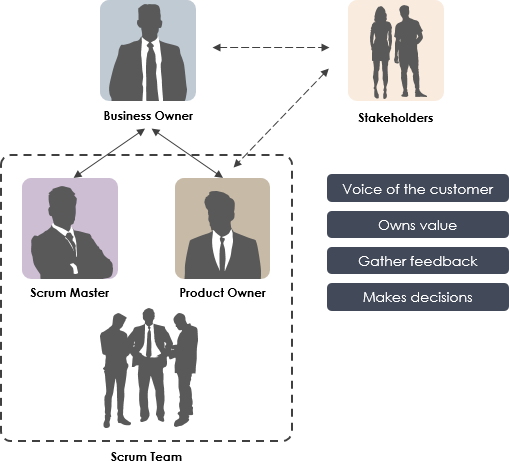یک مالک محصول که به نمایندگی از شرکت مالک محصول است، بخشی ازتیم اسکرام. با این حال، یک مالک محصول هیچ اختیاری بر سایر اعضای تیم ندارد، هماننداسکرام مستر. یک مالک محصول مسئول مراقبت از یک محصول برای مدت طولانی است و مسئول دستیابی به موفقیت محصول میباشد. به عنوان مالک محصول، شما باید به طور مستقیم با مشتریان و کاربران، تیم توسعه و سایر ذینفعان کلیدی تعامل داشته باشید، همانطور که در تصویر زیر نشان داده شده است.

مالکان محصول به دلایل زیر اسکرام را دوست دارند:
- توسعه و کسب و کار اکنون هماهنگ شده و به عنوان یک واحد واحد مسئولیت دارند، نه اینکه در تضاد با یکدیگر باشند مانند روشهای تاریخی.
- برنامهها و هزینهها به طور تجربی پیشبینی میشوند و شما هر روز وضوحی در مورد پیشرفت دارید. پس از هر اسپرینت، مالکان محصول میدانند که اقلام با بالاترین اولویت به طور کامل کار میکنند و قابل ارسال هستند.
- بازخورد مشتری زودهنگام و مداوم است.
- اولین اندازهگیری ملموس ممکن در مورد بازگشت سرمایه (ROI) در دسترس است، یعنی پس از هر اسپرینت.
- حمایت سیستماتیک از نیازهای متغیر کسب و کار، بنابراین اجازه میدهد که انعطافپذیری ادامهدار برای سازگاری با واقعیتهای بازار وجود داشته باشد.
- کاهش ضایعات محصول و فرآیند از طریق تأکید بر توسعه محصول اولویتدار به جای توسعه آثار فرآیند (معمولاً اسناد).
مقالات دیگر مرتبط با نقشهای اسکرام
- تیم اسکرام چیست؟
- تیم خودسازماندهی در اسکرام چیست؟
- تیم اسکرام چگونه کار میکند؟ — راهنمایی مختصر
- چگونه میتوان یک مالک محصول خوب در پروژه اسکرام بود؟
- نقش مالک محصول در اسکرام چیست؟
- توسعه چابک: چگونه میتوان یک اسکرام مستر واجد شرایط شد؟
- خوک و مرغ در اسکرام چیست؟
- مدیر پروژه در مقابل اسکرام مستر در مقابل مالک پروژه
- سه نقش اسکرام چیست؟
- اسکرام مستر چیست؟ نقش و مسئولیتها
- تیم چندوظیفهای در چابک چیست؟
- به عنوان یک اسکرام مستر، چگونه میتوانید به مالک پروژه خود کمک کنید؟
This post is also available in Deutsch, English, Español, Français, Bahasa Indonesia, 日本語, Polski, Portuguese, Ру́сский, Việt Nam, 简体中文 and 繁體中文.













